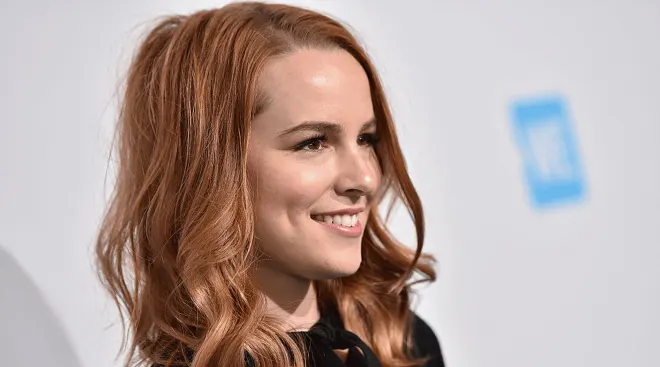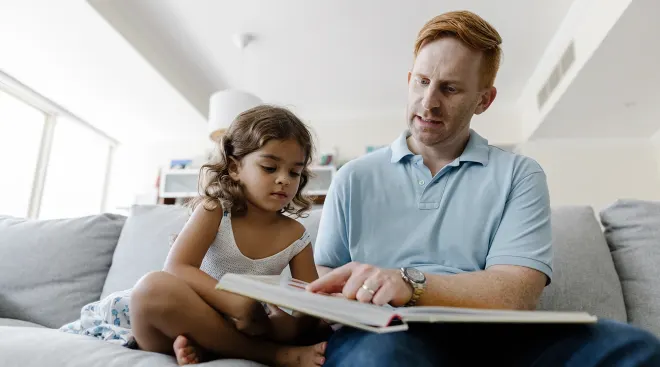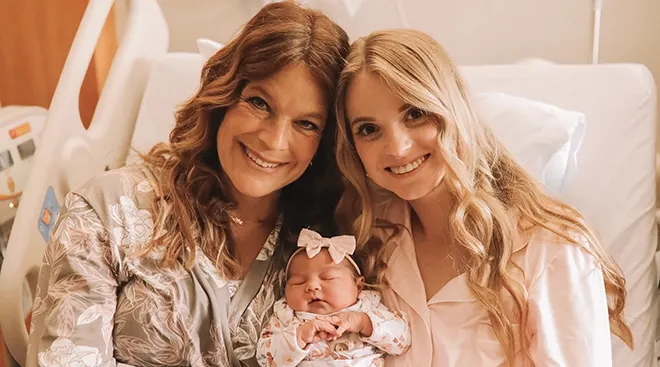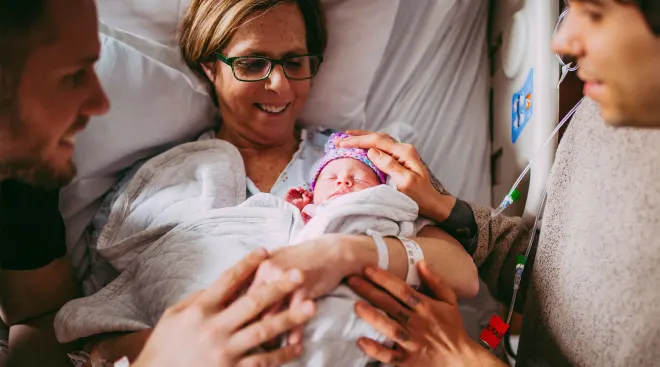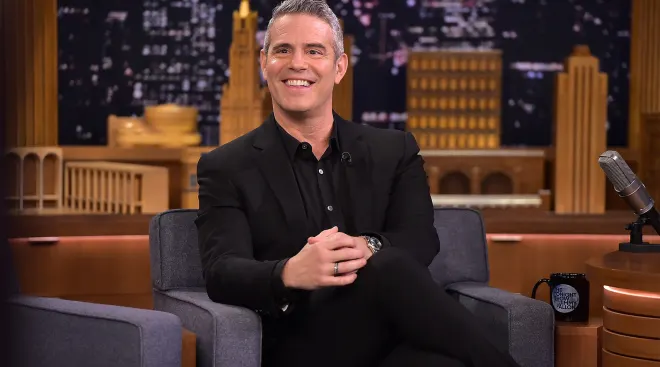Amit Shah and Aditya Madiraju on Fatherhood and Parenting With Pride
Amit Shah, founder of dance company AATMA Performing Arts, and Aditya Madiraju, passionate about (and talented in) all things makeup, went viral in 2019 after sharing their beautiful traditional Indian wedding with the world. Four years later, on May 3, 2023, they welcomed their daughter, Yana Shah Madiraju. Last month in April, shortly before their baby shower and name reveal, The Bump sat down with the couple to talk about their lengthy journey to fatherhood, how they’re approaching parenting and their hopes for the types of dads they want to be.
The Bump: What has your fertility journey been like, thus far?
Amit Shah: It’s been long. It’s been a few years since we started our journey. In the beginning it was just collecting information, getting our options, then going through the process and having many hiccups along the way. But to look back on it—it’s all going to be worth it. We’re at the finish line now.
Aditya Madiraju: Definitely. I think the fertility journey—I don’t even know where it starts technically because, for us, it started almost three and a half years ago, when we went in for testing to see if everything was okay. It was quite slow for the first year and a half at least because we were in the middle of a pandemic and nobody was really working at that point. Then things started moving. This is our fourth try—there were three times when it did not work out, and every time there was a gap of two months, three months. It was just silence and waiting. Now the last month and a half has been a blur. I don’t have any idea as to how many weeks we’re pregnant because it just seems like every day there’s new news—the date has moved three times already. But we’re super excited.
TB: Three and a half years is a very long time. How did you guys get through it?
AS: We knew what we wanted at the end. We just kind of always kept that in mind. I wouldn’t say we were always strong—there were many moments where we were like, “Maybe we should just take a break. It’s getting out of hand.” It’s also financially draining, and a lot of people don’t talk about that. In the beginning of this, to be honest, we didn’t even know if we could go through with it because of the financial resources that we didn’t have at that time….I think we just kept each other strong. Then we signed up with a really great agency that kept us going as well and said, “Don’t worry, it’s gonna happen.” And it’s like this for everybody, you know? Throughout this process you realize it’s really up to God and science.
AM: I think for us, patience was—this process really taught us that things are not in your control. Usually you can control 20 percent of stuff, but here we had like zero control. Every agency works differently, embryos work differently. You might have the best great embryo and it doesn’t work, then wonder what you did wrong. But honestly it’s just timing. I don’t think there’s a scientific logic to it.
TB: People don’t talk about it as much, but it takes such a big toll, not just emotionally and mentally, but also financially. And insurance companies don’t always support LGBTQIA couples and families. What advice would you give to someone who’s going through it and feeling overwhelmed by the financial burdens? What kind of change would you hope to see?
AS: In the beginning, we did feel a little defeated by the system and felt like maybe this wasn’t for us. But then we became part of Facebook groups where dads, single parents or anyone on a similar journey would just tell their story. I think, through that, we found hope because it was like, “Okay, people are doing it. People are figuring it out.” The first thing is getting past that mental hurdle. And you have to set up a savings account. You have to be very diligent about putting money towards what you really want at the end and cut back on other things. We’ve had to make a lot of sacrifices the past few years—like we couldn’t go on elaborate vacations. But it also teaches you very valuable lessons about life: If you want something, you can have it—you just have to work towards it.
AM: I think from an insurance perspective—the funny part is that if we were single or if we were trying to get on this journey as a heterosexual couple, most stuff is covered. It’s almost like because we’re married and we’re a same sex couple, things are not covered, which is sad. There are some grants here and there, which is great, but a heterosexual couple trying to have a kid would be classified under “issues with fertility,” and then everything is covered, or at least a couple of rounds. But because we’re a same sex couple and there is no female involved, we don’t qualify under that. Other than our physical testing separately as individuals, nothing else is covered. That’s basically less than 3 percent of the whole cost—less than that actually. Everything just went out of our pocket. It’s a down payment on a house. We saved for a very long time, but it’s just very scary when you empty out all of your savings not knowing what the future will hold.
AS: And we did that four times.
AM: There are programs out there which support gay couples or those who want to become parents through the process of surrogacy, but you just have to wait. And that wait might be two years, three years, four years, five years, etc. because they cannot extend the funds to everyone. It’s just knowing which path you want to take and how much time you have. Honestly, if you’re someone who’s young and wants to be a parent all by yourself or with someone you’re with, start even before you think you should because this takes a while.
AS: We have such great parents because they were willing to sell all of their property! Unfortunately, it’s the reality of the situation—and it’s not just for same sex couples. We’ve had several friends go through IVF. It’s not exactly the same, but tens of thousands of dollars on every round of IVF. I mean it’s draining. You’re physically going through it, you’re mentally going through it and you’re financially going through it. I don’t know how insurance companies work and how they come up with their policies, but I wish that there was a way to accommodate IVF in same sex and heterosexual couples a little bit more.
TB: Absolutely agreed. Hopefully in the future it gets to a point where it’s not about sexual orientation, rather it’s just about families and people wanting to become parents. Let’s switch gears a little bit. I love that you’re doing a name reveal instead of a gender reveal. Can you tell me a little bit more about the process behind picking your baby name?
AS: I considered my husband because he picked the names. A long time ago, he suggested them.
AM: How it works out between us is I suggest something, he decides no, then we fight and then I convince him. But for some reason—this is why I’m okay saying that we both picked the names—I suggested the names and he was like, “Yeah, that sounds good.”
AS: It grew on me—and it becomes part of your identity. One thing that got us through this journey is thinking about those names as real. Like we’re welcoming this person home.
AM: Our pregnancy coordinator asked for the baby’s name so our gestational carrier could talk to the baby and refer to them by name. All of our email coordination has the baby’s name in it. We’re actually doing a name reveal in three days. It’s a baby shower, which is very late, but we wanted to make it more of a party and fun. Instead of a gender reveal, a name reveal—it’s more than just telling the sex of your baby, it’s actually introducing your baby as a person to everyone, which I think makes more sense.
AS: Instead of celebrating a gender, you celebrate the person…The association of pink and blue—we as a culture are perpetuating these stereotypes.
AM: I think being part of the LGBTQIA community, there are those who do not identify as any sex. They’re those who are non-binary, those who are trans, so you have to be respectful of it. It’s not even about being respectful—it just doesn’t make sense to be like, “This is what we’re having.” Instead it’s, “This is who we’re having.”
AS: When I first came out to my parents, it was when I had someone that I could say was the person I wanted to marry, not the gender I wanted to marry. It’s kind of the same situation here.
TB: Aditya, you have three months of paid leave, which is amazing. Can you tell me a little bit about how you both plan to ensure a balanced parenting workload with the arrival of a new baby?
AM: I’m blessed and have a very supportive workplace. This year the paid leave actually went up by four weeks, so now it’s three months! There’s always scope for improvement—we could do six months, so let’s not cap it there—but three months is a good amount, and I have no complaints.
AS: Our schedules are so unpredictable with what we do. We both have full-time jobs—I have a business, we do social media content and we have many other things that are keeping us really occupied. I feel like the baby’s just going to interrupt all of that, and we’re going to just figure out how to slow down in other ways. And I trust that process—we have two puppies, and when each of them came into our lives everything adjusted naturally.
AM: Also, we’re very open to getting help.
TB: Have you found ways for loved ones who live far away to feel included in your journey? Do you have any tips for other parents-to-be who might be in a similar situation?
AM: My mom passed away in 2020, and I was super close to her. I’m close to my dad too, but my dad is a typical Indian dad—they don’t show their emotions and hold back a lot. When I reached out and told him we’re pregnant—he’s been following our journey for so long—his reaction was, “Oh my god, that’s great!” But he won’t ask extra questions because he thinks it’s personal stuff we probably don’t want to share. Indian parents are so protective. They’re like, “You need money?” And I’m like, “No, I don’t need money, I have money. I want you to ask us questions.” But that’s his way of being there and present…He’s seeing the difference, though, in how we are as dads. I want to be emotionally available and expressive. I think he struggles a bit with expressing his happiness because—I don’t know if he shies away from it or he thinks he shouldn’t because of the “men don’t cry and have to be strong” mentality.
AS: And then my dad’s like a hugger and kisser—a whole different story.
AM: Yeah! But I think FaceTime calls, Zoom calls—also my dad is planning a visit here, and my cousins recently learned the news, so they’ve been texting me nonstop. Everyone’s excited, but it’s more low key on my side. It’s very high-key on his side.
AS: And we’ll obviously take the baby to India at some point.
TB: Are there any cultural traditions or foods that you’re excited to share?
AS: My childhood was really indicative of how I would want my child to experience childhood. We went to India every few years, and we were really in touch with our community. The sense of belonging amongst your neighbors and amongst your—it’s not just about going to school. I’m talking about just riding your bike with friends, you know? I think anything that gives our child that experience—and I think a lot of it will be with cultural events and going to a Diwali party or going to Navratri and going to the temple. Doesn’t have to mean we want our child to be religious, but to just experience it all. We’re not religious, but we were taken to these places when we were younger so we could have our own understanding of religion.
TB: That’s amazing. I also grew up going to cultural events and Diwali parties. It’s nice to have more representation these days and just have people know what Diwali is.
AS: Our friends have kids, and they go to daycares and send us pictures. At school they do Diwali and Holi, Ramadan, Hanukkah—everything. It’s amazing. It’s so nice that they all celebrate each other. That’s the experience we want our kid to have.
TB: Considering your content on social media, how are you approaching technology in parenting? Are there any parenting rules you have around devices?
AS: I think it’s situational. I wouldn’t say we’re extreme in either circumstance. We wouldn’t say no devices, but I don’t think we would say, “Do whatever you want.” I think it’s gonna be a balance of both. I think exposure is important. I think you should be able to see things and you should know what an iPad is. You should not know what the internet is like…especially with social media. That’s a question our parents and my sisters have brought up: Is our kid going to be on social media? And I think so because the world is doing that—as long as we control how much, yeah they are….I think we live in a time where we know too much about everything. Kids should be able to enjoy their life and just experience, make mistakes, fall, get hurt, whatever. It’s on us to be responsible parents who are educated and understand what’s going on.
TB: You’ve provided so much hope and inspiration to people across the globe. As you move into this next phase of your marriage, what does parenting with pride mean to you?
AM: I think the most important thing out of that phrase would be teaching love and acceptance. Just because a kid has gay dads doesn’t mean they’re going to be open and accepting. That’s something that you learn from the first school in your life, which is your home. That’s very important to us: Being kind and having an open mind to learn things—even if you don’t understand it, try to understand it. And if you fail to understand it, learn to respect that person and their choices.
Bullying and stuff like that in school is very scarring. I grew up with that, so I do not want my kid to be part of that. Sure they might not get the best grades, but who cares? It’s life. Everyone’s not supposed to ace every single subject. But if you’re not kind to someone, and if you’re rude to someone, that will be concerning. So parenting with pride is instituting those qualities of kindness, affection and acceptance.
AS: I think we’ve learned the value of love from our parents and that’s why it was so easy for us when we first came out to our parents because they never flinched from their feelings about who we are. We felt equally loved if not more than ever before. I think surrounding a child with love in any way would be pride because, as two fathers, there’s a lot of things that work against us. People associate children with mothers just in general, and a lot of people have commented how our child will be missing a mother. But I think operating from a place of love all the time…At the end of the day, a kid understands love. We see gender—all kids see is who is more loving and they gravitate towards them…. When we first came out to our families, the one thing that my parents said was, “Lead by example,” and you can teach a child the same thing. You surround yourself with the right people and you love them and you’re all in on your relationships. If you pass that information to your child, they’ll also learn by example. They’ll see that you’re kind to people and that they should be kind to people.
TB: Are there any qualities, lessons or advice that your parents have given you that you’re carrying with you on this journey to parenthood?
AM: I have seen my mom and dad—and his mom and dad—interact with other folks, and I love the way they are. Nothing ever starts on a negative note. It’ll always be positive because the kids pick up on that. Kids hear a lot, even when you’re thinking they’re not paying attention. They try to replicate what exactly you say in their circle. If you’re talking about someone at home and not saying good stuff, the kid is going to learn that as acceptable behavior, and it’s not. It’s the unspoken things that kind of dictate what kind of parent you want to be…We’re going to do what we can do. For us, I think being calm, being patient and letting our kid guide us is the most important thing. Teaching them to be loving and accepting of others is another key thing. If you’ve done that, then everything else falls into place.
Navigate forward to interact with the calendar and select a date. Press the question mark key to get the keyboard shortcuts for changing dates.








































